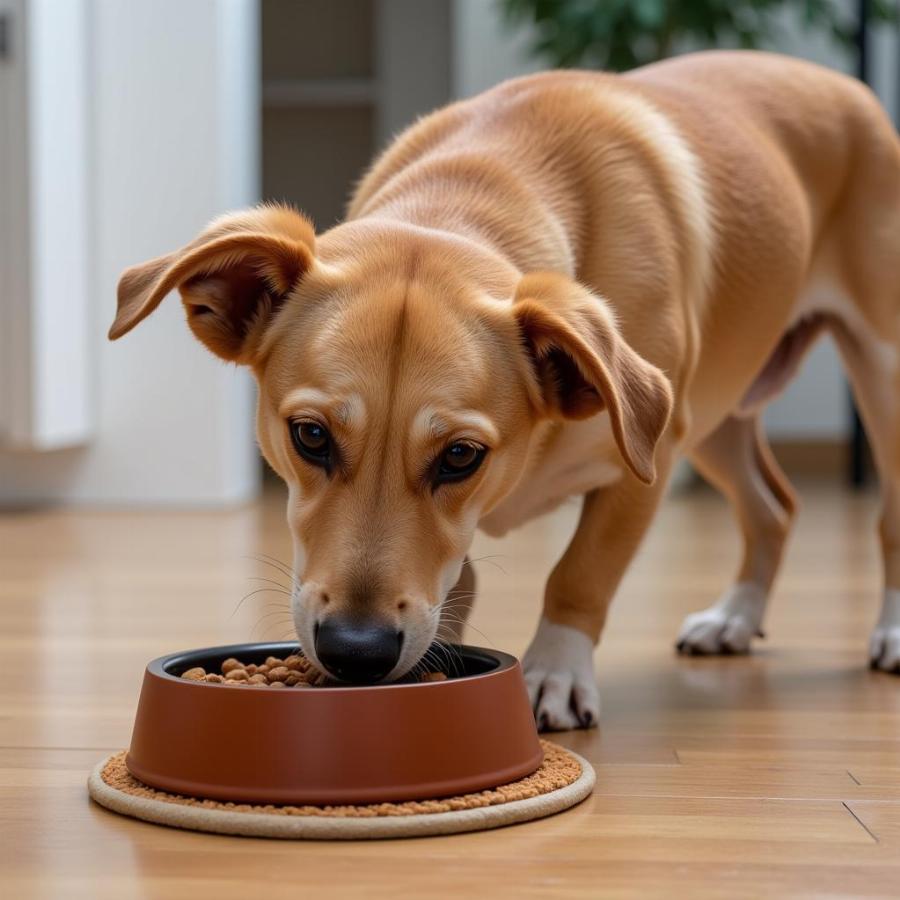Diarrhea in dogs is a common problem that can range from a mild, temporary inconvenience to a sign of a more serious underlying health issue. If you’re asking yourself, “Why does my dog have diarrhea?” you’re in the right place. This article will explore the common causes of dog diarrhea, explain when to worry, and provide guidance on how to help your furry friend feel better.
Decoding Dog Diarrhea: What You Need to Know
Dog diarrhea is characterized by loose or watery stools, often accompanied by an increased frequency of bowel movements. It’s important to remember that occasional loose stools can be normal, especially if your dog has a sensitive stomach. However, persistent diarrhea can be a red flag.
Unraveling the Mystery: Common Causes of Dog Diarrhea
Several factors can contribute to diarrhea in dogs, including:
- Dietary Indiscretion: This is a leading cause of dog diarrhea and refers to your dog eating something they shouldn’t, like garbage, table scraps, or spoiled food.
- Food Intolerance or Allergies: Just like humans, dogs can have sensitivities or allergies to certain ingredients in their food, such as beef, chicken, dairy, or grains.
- Parasites: Intestinal parasites like roundworms, hookworms, whipworms, and Giardia can cause diarrhea, often accompanied by vomiting and weight loss.
- Infections: Viral infections like parvovirus and distemper can cause severe diarrhea, especially in puppies. Bacterial infections, such as Salmonella and E. coli, can also lead to gastrointestinal upset.
- Stress or Anxiety: Dogs are sensitive creatures, and stressful events like moving, a new pet in the house, or loud noises can manifest as diarrhea.
- Medications: Certain medications, like antibiotics, can disrupt the balance of bacteria in the gut, leading to diarrhea.
- Underlying Medical Conditions: In some cases, diarrhea can be a symptom of a more serious underlying health condition, such as inflammatory bowel disease, pancreatitis, or cancer.
When to Worry: Recognizing the Signs of Trouble
While most cases of dog diarrhea resolve with simple home management, it’s crucial to recognize when your dog needs veterinary attention. Contact your veterinarian immediately if your dog’s diarrhea is accompanied by any of the following:
- Blood or mucus in the stool
- Black, tarry stools
- Vomiting
- Lethargy or weakness
- Loss of appetite
- Fever
- Abdominal pain
- Dehydration
“Severe or persistent diarrhea can quickly lead to dehydration in dogs,” cautions Dr. Emily Parker, a veterinarian with over 15 years of experience. “It’s essential to seek veterinary care promptly if you notice any alarming symptoms.”
Soothing the Symptoms: Home Remedies for Dog Diarrhea
If your dog has a mild case of diarrhea and is otherwise acting normally, you can try these home remedies to help settle their stomach:
- Fasting: Withhold food for 12-24 hours to give your dog’s digestive system a break.
- Bland Diet: After the fasting period, introduce a bland diet of boiled chicken and rice or plain cooked pumpkin (not pumpkin pie filling).
- Probiotics: Adding a dog-specific probiotic supplement to your dog’s food can help restore the balance of healthy bacteria in their gut.
- Hydration: Ensure your dog has access to fresh, clean water at all times to prevent dehydration. You can also offer them low-sodium chicken broth or Pedialyte (unflavored) to encourage fluid intake.
Preventing Future Episodes: Proactive Steps for Your Dog’s Digestive Health
- Feed a High-Quality Diet: Choose a high-quality, easily digestible dog food that meets your dog’s nutritional needs.
- Avoid Table Scraps: Resist the urge to feed your dog table scraps, as these can upset their stomach.
- Secure Your Trash: Keep garbage cans securely covered to prevent your dog from scavenging.
- Regular Veterinary Checkups: Schedule regular veterinary checkups and fecal examinations to rule out parasites.
- Preventative Medications: Discuss parasite prevention medications with your veterinarian to protect your dog from intestinal parasites.
 Preventing Dog Diarrhea
Preventing Dog Diarrhea
Beaut Dogs: Your Partner in Canine Care
Beaut Dogs is your trusted resource for all things related to dog health and well-being. We are committed to providing dog owners with accurate, up-to-date information to help them make informed decisions about their furry companions. If you have any concerns about your dog’s health, please don’t hesitate to contact our team of experts at [email protected] for personalized guidance.
Frequently Asked Questions About Dog Diarrhea
Q: How long does dog diarrhea usually last?
A: Most cases of uncomplicated diarrhea resolve within 24-48 hours with proper home management.
Q: When should I take my dog to the vet for diarrhea?
A: Contact your veterinarian immediately if your dog’s diarrhea is severe, bloody, accompanied by other symptoms (vomiting, lethargy, loss of appetite), or persists for more than 48 hours.
Q: Can I give my dog over-the-counter medication for diarrhea?
A: It’s crucial to consult with your veterinarian before giving your dog any over-the-counter medications, as some can be toxic to dogs.
Q: Can stress cause diarrhea in dogs?
A: Yes, stress and anxiety can manifest as digestive upset in dogs, including diarrhea.
Q: What can I feed my dog to help firm up their stool?
A: A bland diet of boiled chicken and rice or plain cooked pumpkin can help solidify your dog’s stool.
Explore More Dog Health Resources on Beaut Dogs
Remember, this article provides general information and should not replace professional veterinary advice. Always consult your veterinarian for any concerns about your dog’s health.